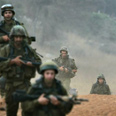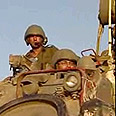

Nevertheless, over 80 percent of the Jewish population feel they can depend on the IDF to defend the country. While faith in the political leadership is quite low, over two-thirds support the decision of the government to go to war against Hizbullah, though the vast majority believes that Israel should have continued the war until either the destruction of Hizbullah or the return of the abducted soldiers.
These are among the primary findings to emerge from the 2007 annual survey of the National Security and Public Opinion Project (NSPOP) of the Institute for National Security Studies. The 2007 survey was conducted in February and March – six months after the Second Lebanon War.
Extremists marginal
One observation affirmed by the study is the strength and stability of the Israeli center. Over half of the Jewish population in Israel can be described as belonging to the center. The hard core extreme-right as well as the hard core extreme-left are marginal, each consisting of no more than 10 percent.
The center, together with the moderate right (13 percent) and moderate left (18 percent) groups, comprises 80 percent of the sample. One can conclude from these results that there is a good deal of flexibility in Israeli public opinion and under certain circumstances – primarily strong and charismatic leadership or dramatic events – there is considerable room for change.
Of all the demographic variables examined, the factor most strongly correlated with the attitudes, positions, and opinions of the respondents is religious self-identification. The strictly Orthodox and religious sectors are significantly more hawkish on almost all political questions relating to the Israeli-Palestinian conflict than the rest of the Jewish population.
The schism between the strictly Orthodox and religious sectors and the majority of the Jewish population should be of great concern, as it poses a serious challenge to the cohesion and unity of Israeli society.
Israelis' threat perceptions increased slightly in 2007, although a significant majority of the Jewish public remains confident that Israel can cope successfully with any conceivable threat. Nuclear weaponry in the hands of Iran is viewed as the most serious threat facing Israel, followed by "corruption in the public system." The number of respondents who see a high or medium chance for outbreak of a war between Israel and an Arab country or Hizbullah in the next three years rose from 37 percent in 2006 to 76 percent in 2007.
Primary conclusions
Among the other major conclusions to emerge from the survey:
- The demographic challenge is of growing urgency to most of the Jewish population and helps define the collective approach to national security issues.
- Israelis remain hawkish on security but dovish on political issues, manifesting a readiness for territorial compromise and concessions in the context of a permanent settlement and an end to the Israeli-Palestinian conflict.
- Israelis remain committed to the search for a solution to the Israeli-Palestinian conflict, even though they question the existence of a viable Palestinian partner and are generally doubtful of the Palestinians' true desire to reach a peace agreement.
- Construction of the security fence continued to enjoy massive support among the Jewish population. Indeed, it is hard to find any issue in Israel about which there is so wide a consensus.
- Unilateralism has been largely rejected as a legitimate political option, primarily given the violent aftermath of the 2005 disengagement and the Second Lebanon War.
- Concern over potential intra-Jewish civil strife in light of a potential agreement with the Palestinians has ebbed, as has the readiness to condone a soldier's right to refuse an order.
Finally, the general mood of the population rose gradually from 2004 to 2006, and then changed direction in 2007. In the aftermath of the Second Lebanon War, the assessment of the general state of the country reverted to the level of 2005. Overall, the national mood and the sense of future prospects are not decisively positive, hovering around the mid-point of a 1-9 scale.
There is, however, a distinct difference between the assessment of the overall state of the country and the assessment of one's own personal state. Not only is the perception of the latter positive and significantly higher than that of the former, but the ratings as to one's own personal state for 2007 maintain the high level of 2006, showing no effects of the Second Lebanon War.
Yehuda Ben Meir and Dafna Shaked are researchers at the INSS (Institute for National Security Studies) in Tel Aviv. Dr. Ben Meir is the director of the National Security and Public opinion Project at INSS.















